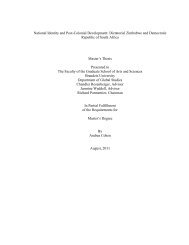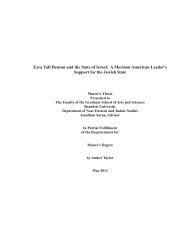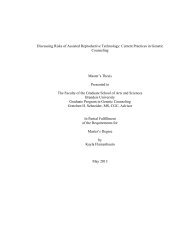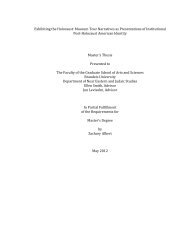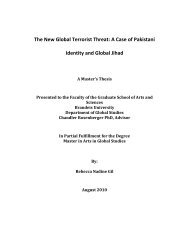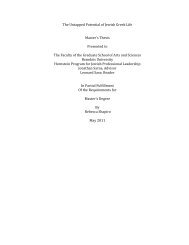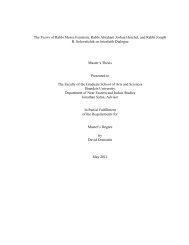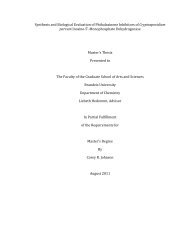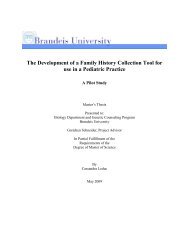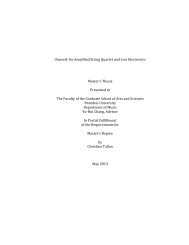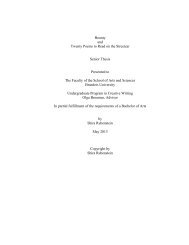A Familiar Frontier: The Kennedy Administration in the Congo ...
A Familiar Frontier: The Kennedy Administration in the Congo ...
A Familiar Frontier: The Kennedy Administration in the Congo ...
Create successful ePaper yourself
Turn your PDF publications into a flip-book with our unique Google optimized e-Paper software.
<strong>in</strong> <strong>the</strong> Katanga and who held its economy toge<strong>the</strong>r.” 14 <strong>The</strong>y were particularlydisappo<strong>in</strong>ted with Hammarskjold’s rush to enter Katanga, as it “did not provide any timefor mean<strong>in</strong>gful negotiations between Mr. Bunche and <strong>the</strong> Katanga authorities.” 15 <strong>The</strong>Belgian government felt that Hammarskjold had disregarded its wishes and acceded to aplan that would placate Lumumba, an understand<strong>in</strong>g that would not be borne out byLumumba’s stated response. <strong>The</strong> United Nations was <strong>in</strong> <strong>the</strong> difficult position of resolv<strong>in</strong>ga conflict between two states with a long history of antagonism and diametricallyopposed agendas, each of whom was important to <strong>the</strong> organization <strong>in</strong> different ways;Hammarskjold could not afford to lose face <strong>in</strong> Africa or <strong>in</strong> Western Europe.<strong>The</strong> United States faced a similar dilemma, a not uncommon problem <strong>in</strong><strong>in</strong>ternational politics when <strong>the</strong> Cold War ran up aga<strong>in</strong>st decolonization. However, <strong>the</strong>Eisenhower <strong>Adm<strong>in</strong>istration</strong> decided decisively that its <strong>in</strong>terests were primarily alignedwith those of Europe. William Burden, <strong>the</strong> U.S. Ambassador to Belgium, wrote a letter toSecretary of State Herter to rem<strong>in</strong>d him of what was most important. While recogniz<strong>in</strong>g<strong>the</strong> difficult position that Herter was <strong>in</strong>, Burden said, “I th<strong>in</strong>k <strong>the</strong> pendulum has nowswung too much <strong>in</strong> <strong>the</strong> <strong>Congo</strong> direction and we must give full consideration to <strong>the</strong> veryserious damage which our actions are caus<strong>in</strong>g to Belgo-American relations andto NATO as a whole.” It was an emerg<strong>in</strong>g dilemma <strong>in</strong> <strong>the</strong> Cold War foreign policy of <strong>the</strong>United States, as Burden realized: “I am sure that cont<strong>in</strong>ued problems of this nature willarise because of <strong>the</strong> <strong>in</strong>evitable dichotomy of try<strong>in</strong>g to do as much as possible <strong>in</strong> Africa14 Memo of Conversation between Herter and Louis Scheyven, FRUS, 1958-1960, 14:38715 Memo of Conversation between Herter and Louis Scheyven, FRUS, 1958-1960, 14:38774





